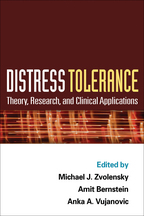Distress Tolerance
Theory, Research, and Clinical Applications
Edited by Michael J. Zvolensky, Amit Bernstein, and Anka A. Vujanovic
Hardcovere-bookprint + e-book
Michael J. Zvolensky, PhD, is Richard and Pamela Ader Green and Gold Distinguished Professor in the Department of Psychology and Director of the Anxiety and Health Research Laboratory at the University of Vermont. His research program cuts across basic and applied work in the area of anxiety disorders. Specifically, his work is focused principally on examining vulnerability processes involved with the onset and maintenance of these disorders. Dr. Zvolensky has been especially involved in better understanding the role of cigarette smoking in terms of the etiology and maintenance of panic psychopathology and, at the same time, the role that panic vulnerability factors may play in smoking cessation.
Amit Bernstein, PhD, is Senior Lecturer and Yigal Alon Fellow in the Department of Psychology and Director of the International Research Collaborative on Anxiety Laboratory at the University of Haifa, Israel. Previously, he was a postdoctoral fellow at the Center for Health Care Evaluation at the VA Palo Alto Health Care System and the Department of Psychiatry and Behavioral Sciences at Stanford University School of Medicine. Dr. Bernstein’s research is focused on specific and transdiagnostic vulnerability and resilience processes underlying anxiety and related disorders, such as addiction.
Anka A. Vujanovic, PhD, is Staff Research Psychologist at the National Center for PTSD—Behavioral Science Division, VA Boston Healthcare System, and Assistant Professor in the Division of Psychiatry, Boston University School of Medicine. Dr. Vujanovic's research program focuses on cognitive-affective and behavioral risk and maintenance factors related to posttraumatic stress disorder and co-occurring posttraumatic stress and substance use disorders.
Amit Bernstein, PhD, is Senior Lecturer and Yigal Alon Fellow in the Department of Psychology and Director of the International Research Collaborative on Anxiety Laboratory at the University of Haifa, Israel. Previously, he was a postdoctoral fellow at the Center for Health Care Evaluation at the VA Palo Alto Health Care System and the Department of Psychiatry and Behavioral Sciences at Stanford University School of Medicine. Dr. Bernstein’s research is focused on specific and transdiagnostic vulnerability and resilience processes underlying anxiety and related disorders, such as addiction.
Anka A. Vujanovic, PhD, is Staff Research Psychologist at the National Center for PTSD—Behavioral Science Division, VA Boston Healthcare System, and Assistant Professor in the Division of Psychiatry, Boston University School of Medicine. Dr. Vujanovic's research program focuses on cognitive-affective and behavioral risk and maintenance factors related to posttraumatic stress disorder and co-occurring posttraumatic stress and substance use disorders.



